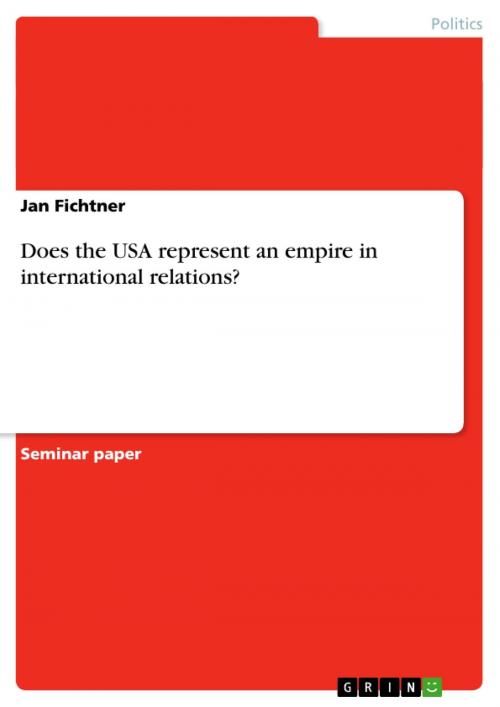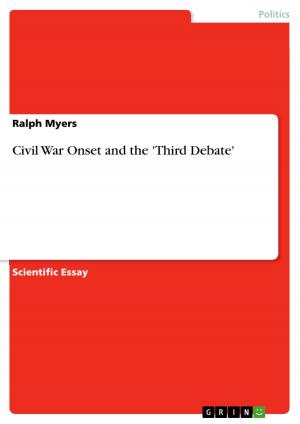Does the USA represent an empire in international relations?
Nonfiction, Social & Cultural Studies, Political Science| Author: | Jan Fichtner | ISBN: | 9783638343107 |
| Publisher: | GRIN Publishing | Publication: | January 24, 2005 |
| Imprint: | GRIN Publishing | Language: | English |
| Author: | Jan Fichtner |
| ISBN: | 9783638343107 |
| Publisher: | GRIN Publishing |
| Publication: | January 24, 2005 |
| Imprint: | GRIN Publishing |
| Language: | English |
Seminar paper from the year 2004 in the subject Politics - International Politics - Region: USA, grade: 1,3 (A), University of Sussex, 28 entries in the bibliography, language: English, abstract: Empires have existed during most of our known history and were dominant factors in shaping regional or world orders in their respective times. Have we know entered a period of history where empires have ceased to exist and the international system is exclusively composed of - formally independent and equal - nation-states? The concept of 'empire' has recently resurfaced after the terrorist attacks of September 11th 2001 and the following campaigns in Afghanistan and Iraq with several scholars claiming that the USA pursues an empire with its unilateralist stance towards other political entities and the preemptive use of its far superior military forces. The following work tries on the one hand to illuminate the concept of empire in general and on the other hand to apply it to the United States of America in order to be able to answer the question on which this paper is based. In the first chapter, it will be tried to identify the distinct characteristics of an empire and to explain why their external behavior is fundamentally different from other political entities called states. Thereafter a limited selection of historical empires will be presented in order to demonstrate how different empires have been in the course of history. Subsequently the four different types of empires analysed shall be contrasted and compared with the contemporary United States of America. In the third chapter the behavior of the United States since the end of bipolarity is assessed mostly in terms of foreign policy and the use of its military capabilities. The focus shall be laid on the period after the demise of Communism, because during the Cold War aggressive actions of the United States were very often justified as being of a defensive nature and necessary to survive the contest for global supremacy with the Soviet Union. In the last chapter the concept of the so-called 'Lockean Heartland' is presented briefly and it is analysed why it is important in understanding the position of the United States in the contemporary system of international relations. Then, why is it important if the United States really represents an empire? Because, if that is the case, it will have an enormous impact for the conduct of international relations in the 21st century, as an empire behaves in a fundamentally different way than a nation-state.
Seminar paper from the year 2004 in the subject Politics - International Politics - Region: USA, grade: 1,3 (A), University of Sussex, 28 entries in the bibliography, language: English, abstract: Empires have existed during most of our known history and were dominant factors in shaping regional or world orders in their respective times. Have we know entered a period of history where empires have ceased to exist and the international system is exclusively composed of - formally independent and equal - nation-states? The concept of 'empire' has recently resurfaced after the terrorist attacks of September 11th 2001 and the following campaigns in Afghanistan and Iraq with several scholars claiming that the USA pursues an empire with its unilateralist stance towards other political entities and the preemptive use of its far superior military forces. The following work tries on the one hand to illuminate the concept of empire in general and on the other hand to apply it to the United States of America in order to be able to answer the question on which this paper is based. In the first chapter, it will be tried to identify the distinct characteristics of an empire and to explain why their external behavior is fundamentally different from other political entities called states. Thereafter a limited selection of historical empires will be presented in order to demonstrate how different empires have been in the course of history. Subsequently the four different types of empires analysed shall be contrasted and compared with the contemporary United States of America. In the third chapter the behavior of the United States since the end of bipolarity is assessed mostly in terms of foreign policy and the use of its military capabilities. The focus shall be laid on the period after the demise of Communism, because during the Cold War aggressive actions of the United States were very often justified as being of a defensive nature and necessary to survive the contest for global supremacy with the Soviet Union. In the last chapter the concept of the so-called 'Lockean Heartland' is presented briefly and it is analysed why it is important in understanding the position of the United States in the contemporary system of international relations. Then, why is it important if the United States really represents an empire? Because, if that is the case, it will have an enormous impact for the conduct of international relations in the 21st century, as an empire behaves in a fundamentally different way than a nation-state.















